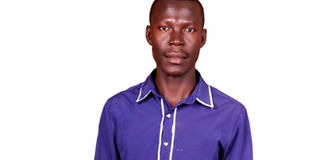An unforeseen passion for teaching autistic children

Isaac Ojok
What you need to know:
THERAPY: We all have dreams and often try to work towards achieving them. As an excellent Science student, Isaac Ojok’s dream was to become an engineer or doctor. Never in his mind did he ever consider being a speech therapist, and yet here he is, and passionate about it
For a man who was forced to study a course he had not applied for, Isaac Ojok is doing well working two jobs. The 28-year-old speech and language therapist has practiced the trade for four years and is now working with CoRSU Rehabilitation Hospital and Centre for Autism Intervention Kampala.
Like many science students at A-Level, Ojok dreamt of charting the conventional course — studying medicine or engineering. However, when he did not make the required grade, he was given a course he had never heard of. At that confusing time, he made Google his friend.
You must have been a very disappointed young man, prowling the Internet for information?
It was hard. Like most people, I knew surgery, medicine and engineering to be the only science courses. When applying to study at Makerere University, my choices were petroleum engineering, cytotechnology, biological science, and radiography. When the results came back, I had not been admitted to any of the courses. Instead, I had been given a course in Speech and Language Therapy.
How did you feel?
I hated it. That course was not my desire. I did not even know what it was about and I did not want to attend the classes. However, my uncle encouraged me to join the university. He was a speech and language therapist at The Nairobi Hospital in Kenya.
Did you eventually grow to love the course?
With my uncle’s urging, I went online and read up everything I could find about the course. When we were given the course outline, I saw two units that interested me – anatomy of the head and neck and the central nervous system. I was joyed and said to myself: “I think this course is a real science”. I had always wanted to become a neurologist and here was an opportunity to study neurology from a different perspective.
Is it true that in Uganda we only have speech therapists for children?
That is not true. However, the problem is that adults have poor health seeking behaviour. So, when they get simultaneous difficulties with speech, feeding and swallowing, they shy away. In the four years I have worked, only five per cent of my clients have been adults. Most of them have neurological conditions resulting from suffering strokes or stammering.
We also help musicians who have lost their voices, although those who come do not complete the sessions.
What kind of children visit speech therapists?
Those who suffer from conditions such as cerebral palsy, Down’s syndrome, late language development, stammering, micro retardation, and learning difficulties.
How many speech therapists does Uganda have?
We have about 45 speech therapists. Of these, 35 are based in Kampala and 10 work outside Uganda. As such, it is impossible for the average rural person to access a speech therapist at the local health centre.
Since the course is conducted in English at the university, if an Asian or Chinese child was brought to you, how would you help them?
I would carry out indirect therapy by giving the caregiver instructions in English and then letting them talk to the child in their mother tongue as I supervise the session.
How long does it take for an accident victim with neurological problems to recover their speaking ability?
It depends on the condition they come with, but basically, the baseline therapy period is six months.
What is it like to work with autistic children?
It is fun. Their brains are very dynamic. You might imagine they are thinking about a particular thing yet they are thinking about something else. The child might pick up a toy car, but instead of playing with it in the conventional way, he will turn it upside down and spin only one wheel.
If you are vibrant, you can enjoy working with these children. But, if you are not open to change, it can be very challenging. That is why very few speech therapists are interested in working with autistic children.
Do you need extra patience as well?
Definitely, because you have to keep rewarding and praising the children even when they do not do what you want them to do. You have to be extremely flexible because you might bring a toy car for them to play with for the day, yet the child wants to draw pictures. So, you have to catch the child in their world and then bring them into your world.
Where do you draw inspiration?
I am inspired by Marie Fenandes, a speech therapist currently pursuing a PhD in the US. I also draw inspiration from Hilda Mary Otim, a speech therapist working as a clinician in Mulago hospital. Both ladies are really well-versed with their work.
What challenges do speech therapists face?
The main challenge is that if you are not well known, it is hard to get patients to work with. You have to be good at your work before people can trust you with their children.
What should someone planning to study this course expect to earn?
If you are good, the sky is the limit; your net savings can be Shs3m per month. However, you have to work smart – you have to work in different places and read a lot so that you have all the information you need at your fingertips.
What does one need to excel at in secondary school to study speech and language therapy?
A student must excel at Biology, Chemistry, and either Mathematics or physics. Of course, a credit in English is a must.




